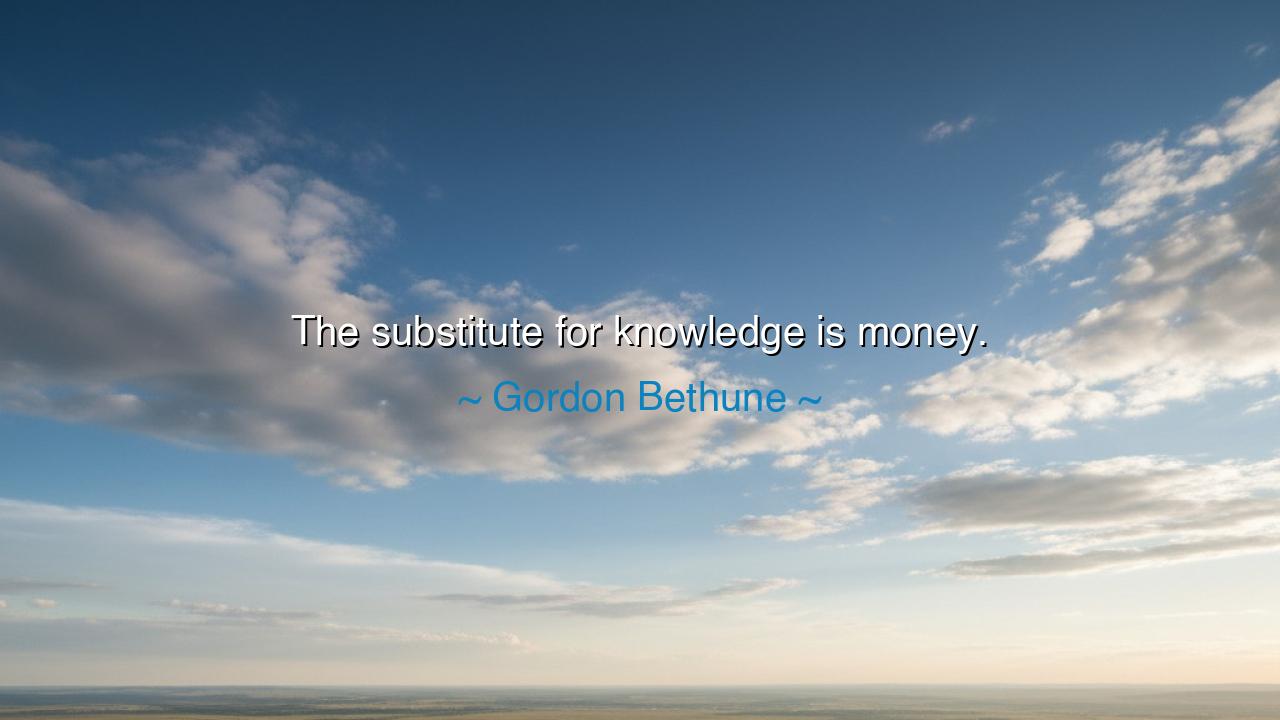
The substitute for knowledge is money.






When Gordon Bethune, the legendary CEO who resurrected Continental Airlines from the brink of ruin, said, “The substitute for knowledge is money,” he spoke with the hard-earned wisdom of a man who had lived both failure and triumph. His words cut deep into the fabric of human ambition — for they reveal the ancient truth that ignorance always demands a costly price. Those who lack understanding must pay in coin what they could have saved through wisdom. Bethune’s statement is not cynical; it is instructive. It reminds us that the world exacts a toll from those who act without learning — and that while wealth can patch the wounds of ignorance, it can never replace the strength of true insight.
The origin of this quote lies in Bethune’s own journey. He took over Continental Airlines when it was collapsing under bankruptcy, disarray, and mistrust. There, he learned that the company had been wasting millions trying to solve problems that knowledge could have prevented — inefficient operations, broken morale, and confused management. When he said, “The substitute for knowledge is money,” he meant that when leaders do not understand their work, they throw money at their ignorance. Instead of learning, they spend. Instead of solving the cause, they pay for the symptoms. In his world — and indeed, in all worlds — knowledge is the most efficient currency, and its absence is the most expensive debt.
This truth is ancient, as old as civilization itself. Consider the story of King Croesus of Lydia, famed for his immense wealth. When he sought to conquer Persia, he asked the Oracle of Delphi if he would be victorious. The Oracle replied, “If you cross the river, you will destroy a great empire.” Croesus, blinded by pride and misunderstanding, assumed it meant his enemy’s empire — but it was his own that fell. His gold could buy armies, advisors, and oracles, but not wisdom. In the end, his ignorance cost him everything. Money without knowledge is like armor without sight — heavy, dazzling, but useless in battle.
Bethune’s statement holds a mirror to every field — from business to governance to daily life. In every age, the wealthy have tried to replace understanding with spending. They build systems that are grand but hollow, invest in technologies they do not comprehend, and chase results without mastering the process. But as history shows, even the richest nations crumble when they forget the art of learning. The Romans, in their decline, paid mercenaries to defend their borders rather than training their own legions; their empire, once built on discipline and strategy, fell to those who understood war better than they. Ignorance, in the end, is the most expensive luxury.
And yet, Bethune’s words are not a condemnation of wealth, but a warning about its misuse. Money is a tool — powerful when guided by knowledge, destructive when wielded without it. The wise do not despise wealth; they use it as a servant of their understanding. The fool, however, makes money his master and loses both wisdom and fortune in its service. In this, Bethune’s wisdom aligns with that of Benjamin Franklin, who said, “An investment in knowledge pays the best interest.” To learn is to earn in the most enduring currency — one that does not inflate, decay, or depend on circumstance.
There is also a moral current flowing beneath his words. Knowledge is earned through humility, effort, and the courage to admit what one does not know. Money, on the other hand, can conceal ignorance for a time, like gilded paint over crumbling stone. But when challenges come — as they always do — the truth of one’s understanding is revealed. The wise face hardship with calm, for they know; the ignorant panic and pay, for they do not. Bethune’s life teaches that wisdom, once gained, multiplies itself — but money, once spent on ignorance, is gone forever.
The lesson, then, is clear: Seek knowledge before wealth, for wealth without knowledge is fragility disguised as power. Let every action be guided by understanding — of craft, of people, of purpose. In your work, learn not only how to do, but why to do. Invest in the mind before the machine, in training before tools, in wisdom before wealth. Money may open doors, but only knowledge shows which ones are worth entering.
And so, let Gordon Bethune’s words echo through every age as both counsel and challenge: “The substitute for knowledge is money.” Learn, therefore, so that your wealth serves your wisdom — not the other way around. For in the end, the richest man is not he who has the most gold, but he who needs the least of it, because he understands the world, himself, and the truth that no fortune can buy: that knowledge is the true treasure of life.






AAdministratorAdministrator
Welcome, honored guests. Please leave a comment, we will respond soon